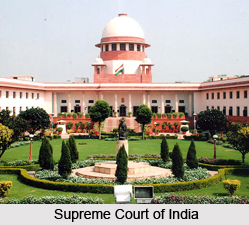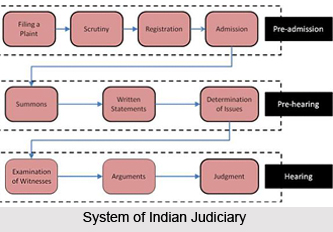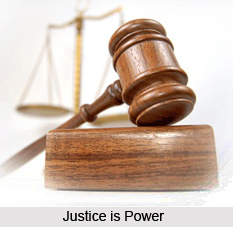 Indian Judiciary is an integrated and unified system. Indian judiciary system is formed on the basis of the British Legal System, which was prevalent in the country during pre-independence era. Very few amendments have been made in the judicial system of India. Part V, Chapter IV of the Constitution of India deals with the Indian judicial system. The Indian Judiciary is organised in a hierarchical form. At the bottom there are numerous Nyaya Panchayats and at the apex there is the Supreme Court. In between the two there are district courts and the High Courts. The Indian courts of adjudication are divided into two groups - Civil courts and Criminal Courts. The courts that deal in general disputes regarding land, property and other such things are called Civil Courts. Criminal Courts are those that deal with murder, riot as well as looting. The Supreme Court, the High Courts and the lower Courts constitute a single Judiciary. Broadly there is a three - tier division.
Indian Judiciary is an integrated and unified system. Indian judiciary system is formed on the basis of the British Legal System, which was prevalent in the country during pre-independence era. Very few amendments have been made in the judicial system of India. Part V, Chapter IV of the Constitution of India deals with the Indian judicial system. The Indian Judiciary is organised in a hierarchical form. At the bottom there are numerous Nyaya Panchayats and at the apex there is the Supreme Court. In between the two there are district courts and the High Courts. The Indian courts of adjudication are divided into two groups - Civil courts and Criminal Courts. The courts that deal in general disputes regarding land, property and other such things are called Civil Courts. Criminal Courts are those that deal with murder, riot as well as looting. The Supreme Court, the High Courts and the lower Courts constitute a single Judiciary. Broadly there is a three - tier division.
Supreme Court and High Courts
In the Indian Judiciary, the Supreme Court is the Apex court in the country. According to the Constitution of India, the role of the Supreme Court of India is that of a centralised court, protector of the Constitution and the highest court of appeal. The High Court stands at the head of the state`s judicial administration. Each state is divided into judicial districts, which is controlled over by a district, and session`s judge, who is the highest judicial power in a district. Below him, there are courts of Civil Jurisdiction, known in different states as Munsifs, Sub-Judges, Civil Judges etc. Similarly, Criminal Judiciary comprises Chief Judicial Magistrate and Judicial Magistrates of First and Second Class. The High Courts are the principal courts of original jurisdiction in the state, and can try all offences including those punishable with death.
The Indian judiciary is famous for being independent and non-partisan. Liberty and equality are the corner stones of a democracy and the preservation of these two conditions is indispensable to the development and is an essential function of a democratic government. The judiciary in India has two fold functions, the preservation of the Constitutional and Legal Rights of all citizens against all encroachments whether by Government or by other individuals. The judiciary is to apply law equally to all irrespective of status, wealth, religion and gender. Thus, judiciary as an organ of the government presents striking difference from the legislature and the executive. This is why the judiciary should be neutral in politics.
Appointment of Judges in Indian Judiciary
The protection of individual liberty by just and impartial trial is therefore regarded as a sacred duty of the judiciary. Thus, it is necessary to keep the judiciary independent of the control of the Executive and Legislature. The separation of the Judiciary from the Executive and the Legislature is a pre- condition for promoting the ends of justice for which the judiciary stands. The independence of the judiciary depends largely on the way in which the judges are appointed. In India, Judges of the Supreme Court and High Courts are appointed by the Executive. The appointing authority is the President of India, who acts on the advice of the Council of Ministers. But the President is required to consult the Chief Justice of Supreme Court at the time of making such appointments. This principle of nominating of the judges by the Executive from among the legal experts and practitioners is more acceptable than the other systems. The executive nomination of the judges is done with adequate safeguard. Part IV of the Indian Constitution deals with the topic of Separation of Judiciary from executive.
 Removal of Judges in Indian Judiciary
Removal of Judges in Indian Judiciary
The independence of the judiciary is guaranteed by the Constitution of India which enacts that every Judge of the Supreme Court will hold office until he attains the age of 65 years and every Judge of the High Court, until the age of 62 years. The Parliament is authorised to prescribe the privileges, allowance, leave and pension of the Judges of the Supreme Court, subject to the safeguard that these cannot be varied during the course of tenure of the judges to their disadvantages. According to the independence of the Indian Judiciary, before removing any judge from his office, there must be a clear probe into the allegations against him and there must be a proper impeachment by the competent authorities following the method embodied in the Constitution of India. Indian Constitution has upheld this provision by laying down that a Judge shall not be removed by the President, except on a joint address by both the House of the Parliament on ground of proved misbehaviour or incapacity.
The Constitution of India insulates the Supreme Court and the High Courts from political criticism, and thus ensures their independence from political pressures and influence, by laying down that neither in Parliament nor in a State Legislature the conduct of a Supreme Court or the High Court Judge in the discharge of his duties can be discussed. The independence of judiciary is further protected by treating the superior courts as the Court of Record. The members of the subordinate judiciary are also protected by the provisions of the Judicial Protection Act.
Role of Attorney General in Indian Judiciary
In Indian Judiciary system, the Attorney General is the chief legal advisor of the Indian Government and its primary lawyer in the Supreme Court of India. He must be a person qualified to be appointed as a Judge of the Supreme Court. The Attorney General for India is appointed by the President of India under Article 76(1) of the Constitution of India and holds office during the pleasure of the President. The Attorney General is responsible for giving advice to the Government of India upon such legal matters and to perform such other duties of legal character as may be referred or assigned to him by the President. Furthermore, the Attorney General has the right of being present in all Courts in India as well as the right to participate in the proceedings of the Parliament. He appears on behalf of Government of India in all cases in the Supreme Court in which Government of India is concerned. He also represents the Government of India in any reference made by the President to the Supreme Court under Article 143 of the Constitution. The Attorney General can accept briefs but cannot appear against the Government. He cannot defend an accused in the criminal proceedings and accept the directorship of a company without the permission of the Government. The Attorney General is assisted by a Solicitor General and four Additional Solicitors General. The Attorney General is to be consulted only in legal matters of real importance and only after the Ministry of Law has been consulted.
Role of Advocate General in Indian Judiciary
An Advocate General in India is a senior law officer of a country who is usually charged with advising the courts or Government on legal matters. According to Article 165 of the constitution of India, the post of Advocate General is appointed. The Advocate General of a State is a Constitutional post and authority. The authority and function of the Advocate General is also specified in the Constitution of India under Article 165 and 177.
Article 165 States-
* The Governor of each State shall appoint a person who is qualified to be appointed a Judge of a High Court to be Advocate-General for the State.
 * It shall be the duty of the Advocate-General to give advice to the Government of the State upon such legal matters, and to perform such other duties of a legal character, as may from time to time be referred or assigned to him by the Governor, and to discharge the functions conferred on him by or under this Constitution or any other law, for the time being in force.
* It shall be the duty of the Advocate-General to give advice to the Government of the State upon such legal matters, and to perform such other duties of a legal character, as may from time to time be referred or assigned to him by the Governor, and to discharge the functions conferred on him by or under this Constitution or any other law, for the time being in force.
* The Advocate-General shall hold office during the pleasure of the Governor, and shall receive such remuneration as the Governor may determine.
Article 177 states-
Every Minister and the Advocate-General for a State shall have the right to speak in, and otherwise take part in the proceedings of, the Legislative Assembly of the State, or, in the case of a State having a Legislative Council, Both Houses, and to speak in, and otherwise to take part in the proceedings of, any committee of the Legislature of which he may be named a member but shall not, by virtue of this Article, be entitled to vote.
Judiciary is a part of the democratic process. Judiciary not only administers justice, it is the protector of the rights of the citizens and it acts as the interpreter and guardian of the constitution. Indian Judiciary is thus an important pillar of Democracy in the country.




















